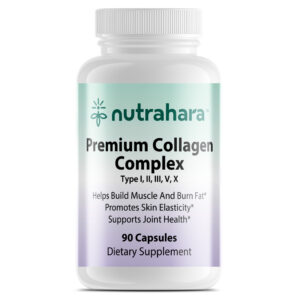
Nutrahara Blog
Nutrahara Blog
Best Vitamins for Arthritis Backed by Science and Real-Life Success Stories
1. Introduction to Best Vitamins for Arthritis
Arthritis is not just a condition of aging—it’s a complex health challenge that can affect anyone, regardless of age or lifestyle. Characterized by joint pain, stiffness, swelling, and reduced mobility, arthritis impacts daily activities such as walking, climbing stairs, or even gripping a coffee cup. While medical treatments like anti-inflammatory drugs and physical therapy remain essential, research increasingly shows that nutrition—particularly vitamin intake—can play a vital role in managing symptoms and protecting long-term joint health.
The best vitamins for arthritis work by addressing the underlying factors that contribute to joint discomfort: inflammation, cartilage breakdown, oxidative stress, and poor bone density. Specific vitamins can help reduce inflammation, repair damaged cartilage, strengthen bones, and improve overall joint mobility. For example, vitamin D supports bone strength, vitamin C boosts collagen production, and vitamin E helps fight free radicals that damage joint tissues.
It’s important to note that the best vitamins for arthritis are not quick fixes. They work best when used consistently and in combination with a healthy diet, regular exercise, and other lifestyle adjustments. By incorporating these vitamins into your daily wellness plan, you can take proactive steps toward reducing arthritis symptoms and enjoying a more active, pain-free life.
2. Understanding Arthritis and the Role of the Best Vitamins for Arthritis
Arthritis is a broad term that describes over 100 conditions affecting the joints, but the two most common types are osteoarthritis (OA) and rheumatoid arthritis (RA).
- Osteoarthritis is a degenerative joint disease caused by gradual wear and tear of the cartilage that cushions bones.
- Rheumatoid arthritis is an autoimmune condition where the immune system mistakenly attacks joint linings, leading to inflammation and damage.
Both types cause pain, stiffness, swelling, and reduced mobility, but their root causes differ. Despite these differences, one factor remains consistent: the role of nutrition in supporting joint health.
The best vitamins for arthritis target multiple aspects of joint function:
- Reducing inflammation: Certain vitamins act as antioxidants, lowering the oxidative stress that worsens arthritis pain.
- Protecting cartilage: Vitamins like C and K support the repair and maintenance of cartilage tissue.
- Strengthening bones: Vitamin D and calcium work together to maintain bone density, which is crucial for stability and preventing fractures.
Deficiencies in these vitamins can accelerate arthritis progression, increase discomfort, and limit mobility. By ensuring the body has adequate amounts of the best vitamins for arthritis, individuals can help slow joint degeneration, improve flexibility, and enhance overall quality of life. For many, combining medical treatment with targeted vitamin supplementation offers a holistic approach to long-term arthritis management.
3. Best Vitamins for Arthritis and How They Work
When it comes to arthritis management, not all vitamins are created equal. The best vitamins for arthritis target the root causes of joint discomfort—reducing inflammation, protecting cartilage, and strengthening bones. Below are the most beneficial vitamins and how they work in the body to support joint health.
3.1 Vitamin D – The Sunshine Vitamin for Strong Joints
Vitamin D is one of the best vitamins for arthritis because it supports calcium absorption, which is essential for bone strength. Low vitamin D levels are common in people with arthritis and can lead to increased pain and faster joint deterioration. Adequate vitamin D also helps regulate immune system function, which is especially important for those with autoimmune conditions like rheumatoid arthritis.
Benefits for arthritis:
- Supports bone mineral density
- Reduces joint pain and stiffness
- Helps regulate immune response
Food sources: Fatty fish (salmon, mackerel), fortified dairy products, egg yolks, mushrooms
Supplementation: Many adults require 800–2000 IU daily, but blood tests can help determine exact needs.
3.2 Vitamin C – Collagen Booster and Antioxidant
Vitamin C is a powerful antioxidant and plays a vital role in collagen synthesis. Collagen is the protein that provides structure to cartilage—the cushioning tissue between bones. Without enough vitamin C, cartilage can weaken, leading to more joint friction and pain. This makes it one of the best vitamins for arthritis in terms of tissue repair and protection.
Benefits for arthritis:
- Promotes cartilage regeneration
- Neutralizes free radicals that damage joints
- Enhances overall immune defense
Food sources: Citrus fruits, strawberries, kiwi, bell peppers, broccoli
Supplementation: Typically 500–1000 mg per day for arthritis support
3.3 Vitamin E – Anti-Inflammatory Powerhouse
Vitamin E is a fat-soluble antioxidant that reduces oxidative damage and inflammation in joints. It works by neutralizing harmful free radicals that trigger inflammatory responses in arthritis. Its role in maintaining healthy cell membranes also supports joint lubrication.
Benefits for arthritis:
- Reduces swelling and pain
- Protects cells from oxidative stress
- Improves joint flexibility
Food sources: Almonds, sunflower seeds, spinach, avocados
Supplementation: Commonly 200–400 IU daily, but always check with a healthcare provider
3.4 Vitamin K – Bone Health and Cartilage Protection
Vitamin K supports the activation of proteins that regulate calcium deposition, ensuring calcium goes into bones rather than forming deposits in soft tissues and joints. This helps maintain bone density while protecting cartilage from calcification—making it one of the best vitamins for arthritis for long-term joint integrity.
Benefits for arthritis:
- Strengthens bone structure
- Prevents joint calcification
- Supports cartilage metabolism
Food sources: Kale, spinach, Brussels sprouts, broccoli, fermented foods
Supplementation: Usually 90–120 mcg per day, depending on dietary intake
3.5 B Vitamins – Energy and Nerve Support for Arthritis Relief
The B-vitamin group—especially B6, B9 (folate), and B12—plays a crucial role in lowering homocysteine levels, which are linked to inflammation and joint damage. These vitamins also support nerve function, helping reduce tingling or nerve-related pain sometimes associated with arthritis.
Benefits for arthritis:
- Reduces joint stiffness
- Supports nerve health
- Improves energy and mood
Food sources: Whole grains, eggs, poultry, legumes, leafy greens
Supplementation: Often taken as a B-complex for balanced benefits
3.6 Omega-3 Fatty Acids – Technically Not a Vitamin, but Vital
While not classified as vitamins, omega-3 fatty acids are so beneficial for arthritis that they’re often included in discussions about the best vitamins for arthritis. They reduce inflammation by blocking inflammatory enzymes and cytokines that contribute to joint pain.
Benefits for arthritis:
- Decreases morning stiffness
- Improves joint mobility
- Reduces need for pain medication
Food sources: Salmon, mackerel, chia seeds, flaxseeds, walnuts
Supplementation: Typically 1000–3000 mg daily of EPA and DHA combined
3.7 Vitamin A – Cellular Repair and Immune Modulation
Vitamin A supports immune system balance and aids in tissue repair, which is crucial for autoimmune-related arthritis. It also acts as an antioxidant, protecting joint cells from damage.
Benefits for arthritis:
- Modulates immune function
- Encourages tissue regeneration
- Provides antioxidant defense
Food sources: Carrots, sweet potatoes, dark leafy greens, liver
Supplementation: Generally 700–900 mcg RAE per day, avoiding excessive doses
4. Scientific Evidence Supporting the Best Vitamins for Arthritis
The benefits of the best vitamins for arthritis are not just anecdotal—they’re backed by numerous scientific studies from reputable institutions. Research over the last two decades has consistently shown that targeted vitamin supplementation can help manage symptoms, slow disease progression, and improve joint function in both osteoarthritis and rheumatoid arthritis.
For example, vitamin D deficiency has been strongly linked to increased pain sensitivity and faster cartilage loss in arthritis patients. A 2013 study in Arthritis & Rheumatism found that people with low vitamin D levels were more likely to experience worsening knee osteoarthritis over time. Correcting this deficiency improved pain scores and mobility in many participants.
Vitamin C has also been studied extensively. Research published in the Annals of the Rheumatic Diseases revealed that individuals with higher vitamin C intake had a significantly reduced risk of cartilage loss and joint deterioration, making it one of the best vitamins for arthritis prevention.
Vitamin E, with its antioxidant properties, has shown measurable reductions in inflammation markers like C-reactive protein (CRP). Trials have also indicated modest improvements in morning stiffness and swelling in rheumatoid arthritis patients.
Similarly, B vitamins, particularly B6 and B12, have been shown to lower homocysteine levels—an amino acid linked to chronic inflammation and joint damage.
In short, the scientific evidence supports what many arthritis patients experience firsthand: adding the best vitamins for arthritis to a healthy lifestyle can significantly improve quality of life, especially when combined with anti-inflammatory foods, regular movement, and medical care.
5. Choosing the Best Vitamins for Arthritis Supplements
Selecting the best vitamins for arthritis isn’t as simple as grabbing the first supplement you see on a store shelf. Quality, formulation, dosage, and nutrient combinations all play critical roles in how well the supplement supports your joint health. Choosing wisely can make the difference between noticeable improvements and little to no effect.
- Quality and Purity
Look for supplements that are third-party tested for quality assurance. This ensures the product contains the stated amount of vitamins without harmful contaminants like heavy metals or synthetic fillers. Certifications from organizations such as USP, NSF, or ConsumerLab are valuable quality indicators. - Bioavailable Forms
Not all vitamin forms are absorbed equally. For example, vitamin D3 is more effective than D2, methylcobalamin is a more active form of B12 than cyanocobalamin, and natural vitamin E (d-alpha-tocopherol) is better utilized than synthetic versions. Choosing bioavailable forms ensures your body gets the maximum benefit from the best vitamins for arthritis. - Synergistic Blends
Many joint health supplements combine multiple nutrients to improve effectiveness. For arthritis, combinations like vitamin D + calcium + magnesium, or vitamin C + collagen, provide synergistic support. Omega-3 fatty acids paired with vitamins D and E can further reduce inflammation. - Avoiding Additives
Check the ingredient list for unnecessary colors, artificial flavors, or fillers that may cause digestive upset or allergic reactions. - Personalization
Your arthritis type, age, diet, and existing health conditions will influence which vitamins you need most. Consulting a healthcare provider for blood tests can reveal deficiencies and guide you toward the best vitamins for arthritis for your unique needs.
By focusing on quality, formulation, and personalization, you can choose supplements that deliver real results and improve daily comfort.
6. 7 Tips for Best Vitamins for Arthritis
While simply knowing the best vitamins for arthritis is important, understanding how to use them effectively can maximize their benefits. The following seven tips will help you integrate these vitamins into your daily life for optimal joint health.
Tip 1: Get Tested for Deficiencies
Tip 2: Pair Vitamins with a Balanced Diet
Tip 3: Combine Vitamins with Anti-Inflammatory Minerals
Tip 4: Use Omega-3s to Boost Vitamin Effectiveness
Tip 5: Take Fat-Soluble Vitamins with Healthy Fats
Tip 6: Be Consistent for Long-Term Benefits
Tip 7: Consult Your Doctor Before High Doses
7. Real-Life Testimonials from Women on the Best Vitamins for Arthritis
Testimonial 1 – Maria, 52
“I struggled with knee pain for years, and it got to the point where climbing stairs was exhausting. My doctor tested my vitamin D levels and found they were very low. I started taking 2000 IU of vitamin D3 daily, along with a calcium supplement. Within three months, the stiffness eased, and I noticed I could walk for longer periods without that dull, aching pain. Now, vitamin D is part of my daily routine, and I truly believe it’s one of the best vitamins for arthritis relief.”
Testimonial 2 – Linda, 47
“My hands were the biggest problem—swollen fingers, stiffness in the mornings, and difficulty gripping. I added a high-quality vitamin C supplement along with collagen powder to my diet. The difference after two months was amazing. My grip improved, the swelling went down, and I can type without constant discomfort. For me, vitamin C is not just a supplement—it’s one of the best vitamins for arthritis and hand function.”
Testimonial 3 – Sharon, 60
“I’ve had osteoarthritis in my ankles for over a decade. A friend recommended a joint health formula that included vitamin D, vitamin K, and omega-3 fatty acids. I was skeptical, but within six weeks I noticed less swelling and better balance. I can now do light hiking again. That supplement—rich in the best vitamins for arthritis—has become a game-changer for my mobility.”
Testimonial 4 – Priya, 55
“My rheumatoid arthritis flares left me feeling exhausted and in pain. I started taking a B-complex supplement with extra B6 and B12 after my doctor said I was deficient. The nerve pain in my legs eased, my energy levels improved, and I feel more motivated to stay active. For anyone with RA, B vitamins deserve a spot on the list of the best vitamins for arthritis support.”
Testimonial 5 – Angela, 49
“Typing for work was becoming unbearable because of arthritis in my wrists. I decided to try vitamin E after reading about its anti-inflammatory effects. It took about a month, but the constant ache subsided, and my joints feel more flexible. I didn’t expect such a noticeable change, but now vitamin E is my go-to choice when I think of the best vitamins for arthritis and inflammation.”
8. Conclusion – Optimizing Joint Health with the Best Vitamins for Arthritis
Living with arthritis can be challenging, but it doesn’t have to mean giving up the activities you love. By integrating the best vitamins for arthritis into your daily routine, you can address some of the root causes of joint discomfort—such as inflammation, cartilage breakdown, and nutrient deficiencies—while also promoting stronger bones and better mobility.
The key takeaway is that vitamins work best as part of a comprehensive arthritis management plan. This includes a nutrient-rich diet, regular low-impact exercise, adequate hydration, quality sleep, and effective stress management. Whether you focus on vitamin D for bone strength, vitamin C for collagen repair, vitamin E for antioxidant protection, vitamin K for cartilage health, or B vitamins for nerve support, each plays a unique and essential role in joint wellness. Omega-3 fatty acids, though not technically vitamins, further enhance the benefits by reducing inflammation and improving flexibility.
Remember, consistency matters. The effects of the best vitamins for arthritis often take weeks or months to become noticeable, but with regular use and the right dosage, they can make a significant difference in your quality of life. Always work with your healthcare provider to personalize your supplementation plan and avoid potential risks.
With a mindful, informed approach, the best vitamins for arthritis can be powerful allies in helping you maintain an active, fulfilling life—one where joint pain no longer defines your every move.
Disclaimer: This article is not a substitute for medical advice. Please consult a healthcare professional before starting any supplement, especially if pregnant, nursing, taking medication, or managing health conditions.
Written by the Nutrahara Team
This article was prepared by the expert team at Nutrahara, which includes experienced nutrition scientists and naturopaths dedicated to advancing women’s health through natural wellness solutions. We combine scientific research with holistic practices to help you live your healthiest life. Connect with us on LinkedIn to stay updated on the latest in women’s health and wellness.












